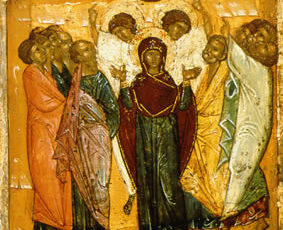Acts 1:1–11 / Ps. 47:2–3, 6–7, 8–9 / Eph. 1:17–23 / Mk. 16:15–20
In today’s First Reading, St. Luke gives the surprising news that there is more of the story to be told. It did not end with the empty tomb or with Jesus’ appearances to the apostles over the course of 40 days. Jesus’ saving work will have a liturgical consummation. He is the great high priest, and he has still to ascend to the heavenly Jerusalem, there to celebrate the feast in the true Holy of Holies.
The truth of this feast shines forth from the Letter to the Hebrews, where we read of the great high priest’s passing through the heavens, the sinless intercessor’s sacrifice on our behalf (see Hebrews 4:14–15).
Indeed, his intercession will lead to the Holy Spirit’s descent in fire upon the Church. Luke spells out that promise in the First Reading for the feast of the Ascension: “in a few days you will be baptized with the Holy Spirit” (Acts 1:5). The Ascension is the preliminary feast that directs the Church’s attention forward to Pentecost. On that day, salvation will be complete; for salvation is not simply expiation for sins (that would be wonder enough), but it is something even greater than that. Expiation is itself a necessary precondition of our adoption as God’s children. To live that divine life, we must receive the Holy Spirit. To receive the Holy Spirit, we must be purified through baptism.
The Responsorial Psalm presents the Ascension in terms familiar from the worship of the Jerusalem temple in the days of King Solomon: “God mounts his throne to shouts of joy: a blare of trumpets for the Lord” (Psalm 47). The priest-king takes his place at the head of the people, ruling over the nations, establishing peace.
The Epistle strikes a distinctively paschal note. In the early Church, as today, Easter was the normal time for the baptism of adult converts. The sacrament was often called “illumination” or “enlightenment” (see, for example, Hebrews 10:32) because of the light that came with God’s saving grace. St. Paul, in his letter to the Ephesians, speaks in terms of glory that leads to greater glories still, as Ascension leads to Pentecost: “May the eyes of your hearts be enlightened,” he writes, as he looks to the divinization of the believers. Their “hope” is “his inheritance among the holy ones,” the saints who have been adopted into God’s family and now rule with him at the Father’s right hand.
This is the “good news” the apostles are commissioned to spread — to the whole world, to all nations, beginning from Jerusalem — at the first Ascension. It’s the good news we must spread today.

